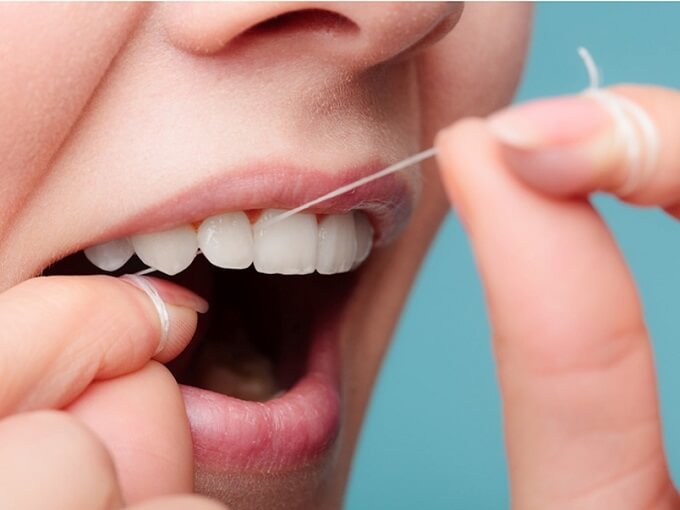Bad breath, otherwise known as halitosis , is characterized as foul-smelling breath that may be caused by certain foods, health conditions or poor dental habits.

Symptoms of Halitosis.
- Post-nasal drip or mucus in general
- A constant sour or bitter metallic taste
- Thick saliva that causes frequent throat-clearing
- A white coating on the tongue
- Persistent dry mouth
- Buildup around the teeth and gums
Causes of Bad Breath
More often than not bad breath starts in your mouth, and there are many possible causes.
- One of the more common causes is leftover particles of food in and around your teeth. If left unbrushed or unflossed, these food particles can increase the amount of bacteria in your mouth and perpetuate bad breath. There are also certain kinds of foods that can turn your breath sour: onions, garlic and some vegetables. Once consumed and digested, these foods enter your bloodstream, which eventually finds its way into your lungs where bad breath can originate. Daily brushing and daily flossing are essential to getting rid of any pesky food particles that may stick around your teeth or gums. The uneven surface of the tongue also can trap bacteria that produce odors. And, if dentures aren’t cleaned regularly or don’t fit properly, they can harbor odor-causing bacteria and food particles as well.
- Are you a pipe or cigarette smoker? Regardless of how good your oral hygiene may be after smoking, the chemicals in tobacco wreak havoc on the mouth. Smokers or smokeless tobacco users are also more likely to have gum disease.
- Dry mouth may be another cause of bad breath. Your own saliva acts as a natural cleanser by helping to remove food and drink particles that may cause bad odors. Dry mouth, also called xerostomia, may cause bad breath because it halts or lessens the production of saliva. Most people experience a mild form of dry mouth every morning with the infamous “morning breath,” which is made worse for those who sleep with their mouths open. Issues with your salivary glands and some diseases may also lead to chronic dry mouth.
Lifestyle and Home Remedies
- Brush your teeth at least twice a day (yes, even at work), especially after meals. Toothpaste with antibacterial properties has been shown to reduce bad breath odors. Couple this with regular flossing, which removes food particles and plaque from between your teeth, and you should have better control of your breath.
- If you don’t already, start brushing your tongue. It harbors bacteria that can lead to bad breath. Some people have a significant overgrowth of bacteria, leading to a coated tongue (from smoking or dry mouth).
- If you wear a bridge or any form of dentures, clean them thoroughly at least once a day, if not twice (as directed by your dentist). Do you have a retainer or mouth guard that you use often? Clean it each time before you put it in your mouth and again once you pull it out. Use the cleaning product that your dentist suggests.
- To keep your mouth properly salivated, avoid tobacco and drink plenty of water instead of soda, coffee or alcohol since these tend to dry out the mouth. You can also chew gum or enjoy sugarless candy to increase your saliva production, which can help clean your mouth during the day. If you have trouble producing saliva, your dentist or primary care physician can prescribe an artificial saliva solution or a medication taken orally to jump-start your salivary glands
BRUXISM
Bruxism is also known as grinding and/or clenching of your teeth. It’s a very common condition that affects approximately 30 million to 40 million children and adults.
If you notice any of the following symptoms, you may be experiencing bruxism:
- Rhythmic contractions of the jaw muscles
- A grinding sound at night, which may disturb the sleep of someone who you share a room with
- Jaw muscles that are tight or painful
- Popping or clicking of the temporal mandibular joint
- Long-lasting pain in the face
- Damaged teeth, broken dental fillings and injured gums
- Headache
- Swelling (occasionally) on the side of your lower jaw caused by clenching
Some experts consider bruxism to be a habit, while others attribute it to one of the following:
- Stress, anxiety, frustration and anger
- A malocclusion, or when the teeth and jaw do not line up correctly
- A symptom of certain rare diseases of the nerves and muscles in the face
- In rare cases, it may be a side effect of some medicines that treat depression. These include Prozac (fluoxetine), Zoloft (sertraline) and Paxil (paroxetine).
- A complication of Huntington or Parkinson’s disease
- Treatment
- The simplest solution is to use a professionally made night guard, which prevents the teeth from scraping against each other while you sleep. Your dentist may also have to restore damaged teeth with fillings or crowns to maintain the proper shape and size of the teeth.
Brushing
- Place the toothbrush at a 45°angle along the gum line. Move the toothbrush in a back and forth motion, and repeat for each tooth.
- Brush the inside surface of each tooth, using the same back and forth technique.
- Brush the chewing surface (top) of each tooth.
- Use tip of brush to brush behind each tooth — front and back, top and bottom and up and down strokes.
- Be sure to brush your tongue to remove odor causing bacteria.
Flossing

- Pull 18 to 24 inches of dental floss from the floss dispenser.
- Wrap the ends of the floss around your index and middle fingers.
- Hold the floss tightly around each tooth in a C shape; move the floss back and forth in a push-pull motion and up and down against the side of each tooth.


Thanks for all your initiatives that you have put in this very worthwhile content. Ulrikaumeko Ichabod Immanuel
Your site provides very good and useful information. I hope it continues for a long time. Thank you